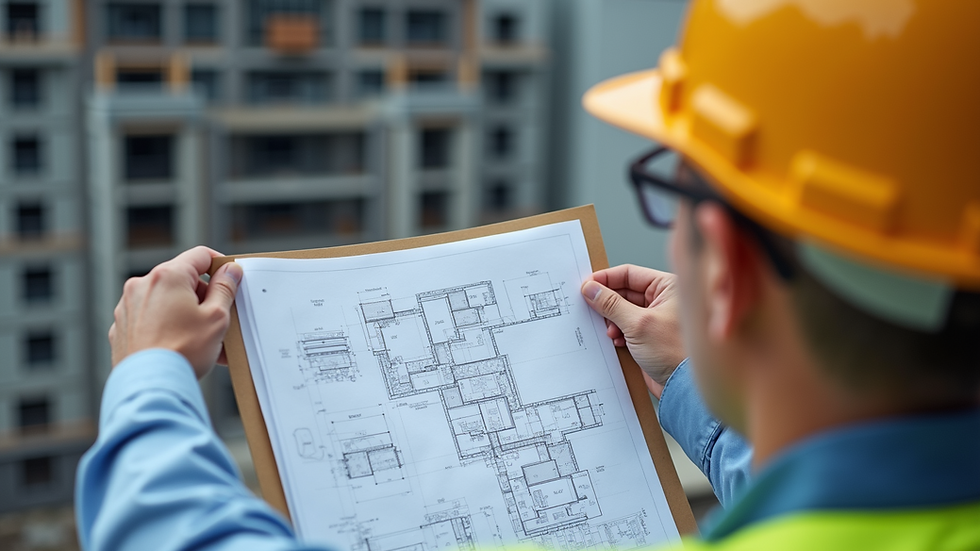Maximizing Project Success With Owner’s Representation
- Kimberley Barnes
- Sep 8
- 3 min read
Successfully managing a construction or development project requires more than just a good plan and budget. It demands constant oversight, expert decision-making, and clear communication among all parties involved. This is where owner representation services come into play. By having a dedicated professional or team acting on behalf of the project owner, the chances of delivering a project on time, within budget, and to the desired quality increase significantly.
The Importance of Owner Representation Services in Project Management
Owner representation services serve as the owner's eyes and ears on the ground. They bridge the gap between the owner and contractors, architects, engineers, and other stakeholders. This role is crucial because owners often lack the technical expertise or time to manage every detail of a project.
Some key benefits of owner representation services include:
Improved Communication: Representatives ensure that all parties are aligned with the project goals and timelines.
Risk Mitigation: They identify potential issues early and propose solutions before problems escalate.
Cost Control: By monitoring expenses and change orders, they help keep the project within budget.
Quality Assurance: They verify that work meets the specified standards and requirements.
Time Management: Representatives track progress and help avoid delays.
For example, in a commercial building project, an owner’s representative might coordinate weekly site meetings, review contractor invoices, and ensure compliance with safety regulations. This proactive involvement prevents costly overruns and misunderstandings.

How Owner Representation Services Enhance Project Outcomes
Owner representation services add value by providing expertise and dedicated focus on the owner's interests. Here are practical ways they maximize project success:
Detailed Project Planning: Representatives assist in developing realistic schedules and budgets based on thorough analysis.
Vendor and Contractor Management: They evaluate bids, negotiate contracts, and monitor contractor performance.
Change Order Management: When project changes arise, representatives assess impacts and negotiate fair adjustments.
Regulatory Compliance: They ensure all permits and inspections are completed on time.
Documentation and Reporting: Regular reports keep the owner informed and provide a record for future reference.
Consider a hospital expansion project where the owner’s representative coordinates between medical staff and construction teams to minimize disruptions. Their involvement ensures that critical areas remain operational while construction proceeds smoothly.

Who Acts as the Owner's Representative?
The role of an owner’s representative can be filled by various professionals depending on the project size and complexity. Common candidates include:
Project Managers: Experienced in construction and project delivery, they oversee all aspects of the project.
Construction Managers: Focused on the construction phase, they ensure quality and schedule adherence.
Consultants: Specialists in architecture, engineering, or cost estimating who provide expert advice.
Third-Party Firms: Companies offering comprehensive owner representation services, combining multiple disciplines.
The ideal representative possesses strong communication skills, technical knowledge, and a commitment to the owner's goals. They act as a trusted advisor and advocate throughout the project lifecycle.
For instance, a real estate developer might hire a third-party firm to provide owner representation services, ensuring impartial oversight and expert guidance.

Practical Tips for Selecting and Working with an Owner’s Representative
Choosing the right owner’s representative is critical. Here are actionable recommendations:
Define Your Needs: Understand the scope and complexity of your project to determine the level of representation required.
Check Credentials: Look for certifications such as PMP (Project Management Professional) or CCM (Certified Construction Manager).
Review Experience: Prioritize candidates with relevant project experience similar to yours.
Clarify Roles: Establish clear responsibilities and communication protocols upfront.
Set Performance Metrics: Agree on key performance indicators to measure success.
Maintain Open Communication: Regular updates and transparency build trust and prevent surprises.
Once engaged, empower your representative with access to necessary information and decision-making authority. This enables them to act swiftly and effectively.
Leveraging Owner’s Representative Services for Long-Term Success
Beyond individual projects, owner representation services contribute to long-term organizational success. They help build a repository of knowledge, improve vendor relationships, and refine project management processes.
Owners who consistently use these services benefit from:
Reduced Project Risks: Early detection and resolution of issues.
Better Budget Management: Avoidance of unexpected costs.
Enhanced Quality: Consistent adherence to standards.
Stronger Stakeholder Relationships: Improved collaboration and satisfaction.
To maximize these benefits, consider integrating owner representation into your standard project delivery approach. This strategic investment pays dividends in smoother projects and better outcomes.
For those interested in exploring professional owner's representative services, partnering with experienced providers can transform your project experience.
By understanding the critical role of owner representation services and applying best practices, project owners can significantly increase the likelihood of success. Whether managing a small renovation or a large-scale development, having a dedicated representative ensures your vision becomes reality efficiently and effectively.







Comments